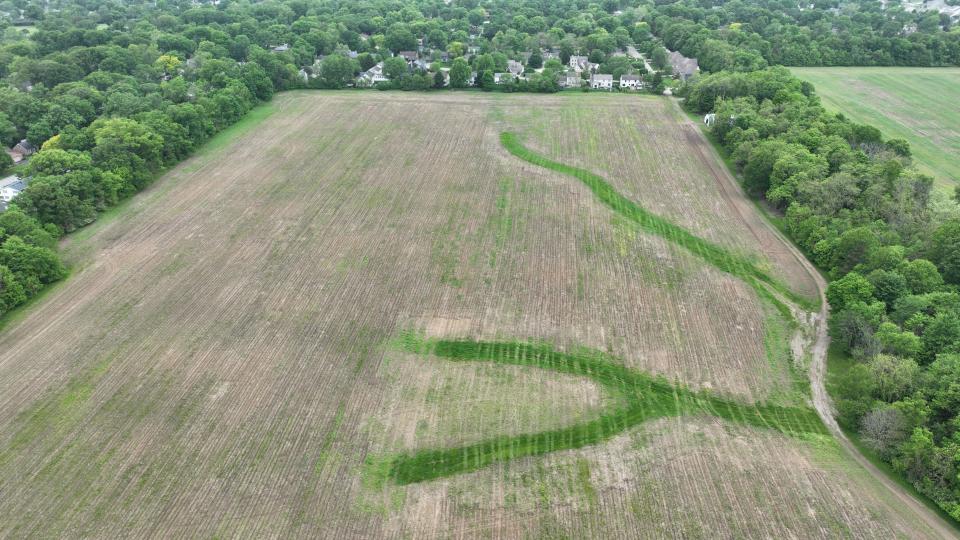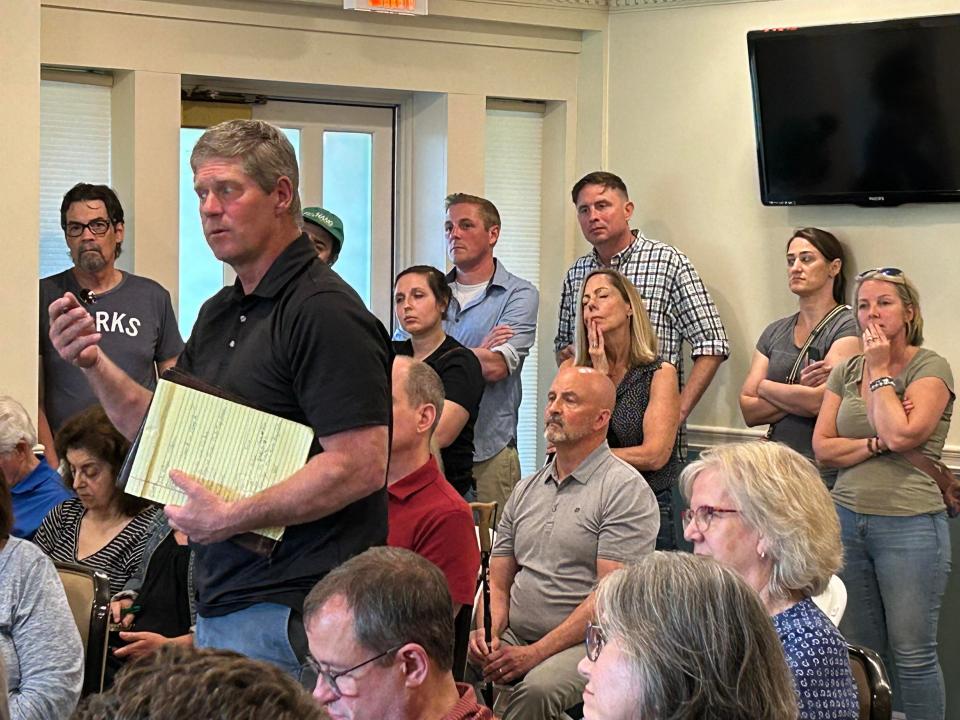The last of nearly 100 tanker truckloads of treated sanitary sewer waste were applied May 7 to the soil of the historic, 122-acre Hickory Bluff Farms tucked just inside the northwest corner of Interstate 270 and Route 315.
This left some neighbors concerned about traffic, odor and the proximity of biosolids to their homes, streams and drinking water.
Biosolids, technically, are the end result of a complicated filtration process: solid organic matter used as fertilizer. They include byproducts of human waste flushed down toilets into the sewage system for treatment.
Hickory Bluff Farms are just the latest recipient of this byproduct that the Ohio Environmental Protection Agency has granted permits to spread on farmlands in many places elsewhere across the state. Hickory Bluff is surrounded by homes — including Worthington Hills, Old Woods and Mount Air neighborhoods — as well as Worthington Hills Country Club to its south and Highbanks Metro Park, across Route 315 and the Olentangy River to its east.
The farm’s proximity to waterways and growth in the area is one reason why about 75 people filled a meeting room Wednesday with questions and concerns.
Those who live closest, in Perry and Sharon townships, soon found out that the trucks contained biosolids, which are byproducts of human waste hauled from the city of Columbus’ two wastewater treatment plants, Jackson Pike and Southerly. The two plants on the city’s South Side process sewage from Columbus and more than 20 suburban communities under contract.
A video of how Columbus’ Jackson Pike wastewater treatment plant works
“This is farmland, but you don’t usually have residential all around it,” Perry Township Administrator Beth Beatty said of the situation with Hickory Bluff Farms.

Hickory Bluff has been in the Hadden family since the 1890s, said Steve Hadden, who has been actively farming it for the past few years, in part, he said, because no other farmers were willing to rent it from him.
“All the small- to medium-sized farmers have said, ‘We don’t want to deal with the neighbors and getting our equipment in and out,'” he said, noting the lack of good access to the farm.
Hadden said he must continue to operate the farm, tilling the fields for soybeans, in order to maintain the property’s farm status for property tax reductions known as current agricultural use value. Without active farming, he estimates he’d be paying $8 million annually in residential property taxes, compared to as little as $20,000 as a farm.
Financial pressures also forced him to look into alternative fertilizers. In December 2023, the Ohio EPA granted him a permit to receive biosolids from City of Columbus wastewater plants at no cost to him.
The city of Columbus paid Deer Valley Farm Supply in Licking County $37,891 to haul Hadden’s supply from the Jackson Pike wastewater treatment plant in a series of 97 trips, which ended May 7.
Environmental consultant says rain may wash out biosolids
Perry Township trustees hosted a meeting on the biosolids at the farm at the Worthington Hills Country Club meeting room, which was packed with residents Wednesday. A previous meeting on the matter was hosted the week before by Sharon Township trustees.
Officials sat in front of a picture window overlooking a putting green on the 18-hole golf course.
Perry Township Trustee Andy English, a landscape architect familiar with biosolids, began by saying the waste is highly regulated, an alternative to synthetic fertilizer, stable within the soil and able to break down to provide plant nutrients.
“The misunderstanding is that this will keep piling on,” he said. “Think of it as fertilizing your yard with two applications a year.”


It didn’t take long for residents to tee off with concerns that truck traffic was stifling and dangerous, that biosolid applications were too close to homes and wondering what is contained in human waste byproducts.
“The concern is that there are things that aren’t being tested for,” said Nellie Wilbers, who plans to soon move into her “dream home” in Mount Air. “If we’re not testing for it, we can’t know what’s there.”
Wilbers was referring to so-called forever chemicals emitted from many plastics and chemicals, pharmaceuticals improperly disposed of and certain heavy metals. She wasn’t the only one to express such concerns.
“I have a friend who sells soybeans. Wait until he finds out biosolids are being used to grow them. They won’t be able to sell them,” one man said.
The onslaught continued. Concerns about runoff leeching into well water and a nearby aquifer. Why was there just one small sign informing residents of the days of application?
Perry Township Trustee James Roper tried to answer, explaining that local officials don’t test anything: “We’re kind of stuck with their (the EPA’s) methodology, their processes.”
Finally, Julie Weatherington-Rice, an environmental consultant with an extensive background in soil science, hydrology and groundwater study, took the lead, stating that biosolids may be a viable alternative to synthetics, but because of the area’s clay and silt soils, they might not be retained, especially following a rain.
“When it rains, it will start to flush out,” she said. “It won’t stay in the soil.”
“Where will it go?” a resident asked, quickly answered by another: “Mount Air.”
Laughter momentarily broke the tension in the room. Many leaned forward to hear Weatherington-Rice say that the recent smell in ditches might be due to “short-circuiting” in the farm’s soil, displacing the solids into the water table.
Laura Kunze, a resident of Mount Air and a Sharon Township trustee, said her neighbors already rely on septic systems and well water and don’t need another hazard to monitor.
When the first applications were made a couple of weeks ago, followed by rain, ditches near their homes began to smell.
“It smelled like somebody took a dump and didn’t run the fan,” she said, not like the earthy mulch smell that many described.
Any additional runoff “from somebody else’s waste, I think is egregious,” Kunze said.
Columbus sewers official praises ‘circle of life’ efficiency
Stacia Eckenwiler, assistant administrator with Columbus’ Department of Public Utilities, Division of Sewers and Drains, did not attend the meeting. But she told The Dispatch that she isn’t surprised that residents have misinformation or what she considers unfair perceptions.
A searchable database of Ohio’s biosolids application sites shows none within the I-270 outerbelt, except near the wastewater plants on the South Side. Most of the others are on larger farms not being squeezed by new homes or businesses.
She said humans, like the treatment plants, deal with their waste products.
“When we defecate, we have an odor to it. We do the best we can to control it. We have to manage it. It’s who we are,” Eckenwiler said.
The process of large filters, centrifuges and biodigesters help divert the waste from landfills and groundwater.
Biosolids become usable only after “micro-organisms, kind of like a stomach, reduce the amount of volatile solids that would otherwise cause it to be more smelly or attractive to rodents or flies,” Eckenwiler said.
“Our product is organic. It’s part of the food cycle,” she added. “We’re taking what came from the earth and putting it back into the earth. We don’t have to mine phosphorous out of the ground or use synthetic fertilizer.”
After the meeting, Hadden told Weatherington-Rice that he would check in with her before any future application.
“I’m reassured that there’s someone like you that has this level of education and diverse experience,” Hadden said. “My promise to you is I’m not going to apply it again until I talk to you.”
This article originally appeared on The Columbus Dispatch: Neighbors upset Ohio EPA lets Columbus-area farmer spread human waste
Source Agencies


